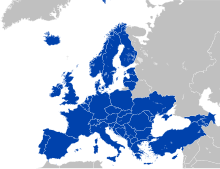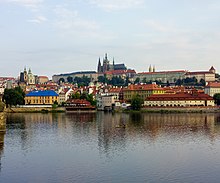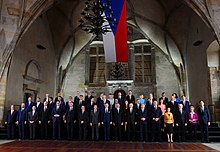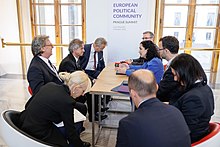
The European Council is one of the seven Institutions of the European Union where EU leaders meet to set the political agenda of the union, but they do not pass laws.

The Collective Security Treaty Organization (CSTO) is an intergovernmental military alliance in Eurasia consisting of six post-Soviet states: Armenia, Belarus, Kazakhstan, Kyrgyzstan, Russia, and Tajikistan, formed in 2002. The Collective Security Treaty has its origins in the Soviet Armed Forces, which was replaced in 1992 by the United Armed Forces of the Commonwealth of Independent States, and was then itself replaced by the successor armed forces of the respective independent states.

There are no diplomatic relations between Armenia and Azerbaijan. The two neighboring states had formal governmental relations between 1918 and 1921, during their brief independence from the collapsed Russian Empire, as the First Republic of Armenia and the Democratic Republic of Azerbaijan; these relations existed from the period after the Russian Revolution until they were occupied and annexed by the Soviet Union, becoming the constituent republics of Soviet Armenia and Soviet Azerbaijan. Due to the five wars waged by the countries in the past century—one from 1918 to 1921, another from 1988 to 1994, and the most recent in 2016, 2020 and 2023 —the two have had strained relations. In the wake of hostilities, social memory of Soviet-era cohabitation is widely repressed.
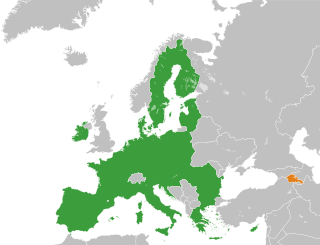
Armenia and the European Union have maintained positive relations over the years. Both parties are connected through the Comprehensive and Enhanced Partnership Agreement (CEPA), which was signed in 2017. Former Armenian Foreign Minister Eduard Nalbandyan expressed confidence that the new partnership agreement would "open a new page" in EU–Armenia relations. Meanwhile, the former High Representative of the Union for Foreign Affairs and Security Policy, Federica Mogherini concluded in June 2019, that Armenia–EU relations are on an "excellent" level.

Bilateral relations between modern-day Armenia and the Russian Federation were established on 3 April 1992, though Russia has been an important actor in Armenia since the early 19th century. The two countries' historic relationship has its roots in the Russo-Persian War of 1826 to 1828 between the Russian Empire and Qajar Persia after which Eastern Armenia was ceded to Russia. Moreover, Russia was viewed as a protector of the Christian subjects in the Ottoman Empire, including the Armenians.
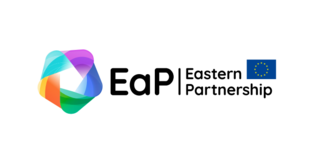
The Eastern Partnership (EaP) is a joint initiative of the European Union, together with its member states, and six Eastern European countries. The EaP framework governs the EU's relationship with the post-Soviet states of Armenia, Azerbaijan, Belarus, Georgia, Moldova, and Ukraine. The EaP is intended to provide a forum for discussions regarding trade, economic strategy, travel agreements, and other issues between the EU and its Eastern European neighbours. It also aims at building a common area of shared values of democracy, prosperity, stability, and increased cooperation. The project was initiated by Poland and a subsequent proposal was prepared in co-operation with Sweden. It was presented by the foreign ministers of Poland and Sweden at the EU's General Affairs and External Relations Council in Brussels on 26 May 2008. The Eastern Partnership was inaugurated by the EU in Prague, Czech Republic on 7 May 2009.

Nikol Vovayi Pashinyan is an Armenian politician serving as the prime minister of Armenia since 8 May 2018. A journalist by profession, Pashinyan founded his own newspaper in 1998, which was shut down a year later for libel. He was sentenced for one year for defamation against then Minister of National Security Serzh Sargsyan. He edited the newspaper Haykakan Zhamanak from 1999 to 2012. A supporter of Armenia's first president Levon Ter-Petrosyan, he was highly critical of second president Robert Kocharyan, Defense Minister Serzh Sargsyan, and their allies. Pashinyan was also critical of Armenia's close relations with Russia, and promoted establishing closer relations with Turkey instead. He led a minor opposition party in the 2007 parliamentary election, garnering 1.3% of the vote.
The EU Strategy for the South Caucasus is a long term strategy which is directed to create a secure political, economical and social environment next to the eastern borders of the European Union. This is an objective of the European Neighbourhood Policy, and forthcoming Eastern Partnership Program.

Civil Contract is a centrist political party in Armenia. It has been the ruling party of Armenia since the 2018 Armenian parliamentary election, which occurred following the 2018 Armenian Revolution that brought the party's founder, Nikol Pashinyan, to power as prime minister.

The von der Leyen Commission is the current European Commission, in office since 1 December 2019 and is to last until the 2024 elections. It has Ursula von der Leyen as its president and it further consists of one commissioner from each of the member states of the European Union.

The military forces of Armenia and Azerbaijan have been engaged in a border conflict since 12 May 2021, when Azerbaijani soldiers crossed several kilometers into Armenia in the provinces of Syunik and Gegharkunik. Despite international calls for withdrawal from the European Parliament, the United States, and France, Azerbaijan has maintained its presence on Armenian soil, occupying at least 215 square kilometres (83 sq mi) of internationally recognized Armenian territory. This occupation follows a pattern of Azerbaijan provoking cross-border fights and instigating ceasefire violations when its government is unhappy with the pace of negotiations with Armenia.

The 2022 Armenian protests were a series of anti-government protests in Armenia that started on 5 April 2022. The protests continued into June 2022, and many protesters were detained by police in Yerevan. Protestors demanded Prime Minister of Armenia Nikol Pashinyan resign over his handling of the 2020 Nagorno-Karabakh war. On 14 June 2022, the opposition announced their decision to terminate daily demonstrations aimed at toppling Prime Minister Nikol Pashinyan after failing to achieve popular support.

The European Political Community (EPC) is an intergovernmental forum for political and strategic discussions about the future of Europe, established in 2022 after the Russian invasion of Ukraine. The group first met in October 2022 in Prague, with participants from 44 European countries, as well as the Presidents of the European Council and the European Commission. It is distinct from both the European Union and the Council of Europe.

On 12 September 2022, a series of clashes erupted between Armenian and Azerbaijani troops along the Armenia–Azerbaijan border, marking a major escalation in the current border crisis between Armenia–Azerbaijan and resulting in nearly 300 deaths and dozens of injuries on both sides by 14 September. A number of human rights organizations and governments – including the United States, European Parliament, Canada, France, Uruguay, Cyprus – stated that Azerbaijan had launched an attack on positions inside the Republic of Armenia.

The European Union Monitoring Capacity to Armenia (EUMCAP) was a European Union civilian deployment in the territory of the Republic of Armenia that was agreed on 6 October 2022 and officially became operational on 20 October 2022. The EUMCAP completed its mandate on 19 December 2022 at which point it was superseded by a European Union Planning Assistance Team in Armenia in preparation of a possible longer-term mission in the country.

The Second European Political Community Summit was a meeting of the European Political Community held on 1 June 2023 at Mimi Castle, Bulboaca, 35 kilometres from Chișinău, Moldova. It was attended by forty-five heads of states and governments, as well as leaders of European Union institutions.

The European Union Mission in Armenia (EUMA) is a European Union Common Security and Defence Policy civilian deployment on the territory of the Republic of Armenia.

The Third European Political Community Summit was a meeting of the European Political Community held on 5 October 2023 at the Granada Conference Centre in Granada, Spain.

The Fourth European Political Community Summit is a planned meeting of the European Political Community to be held on 18 July 2024 at Blenheim Palace in Woodstock, United Kingdom.


